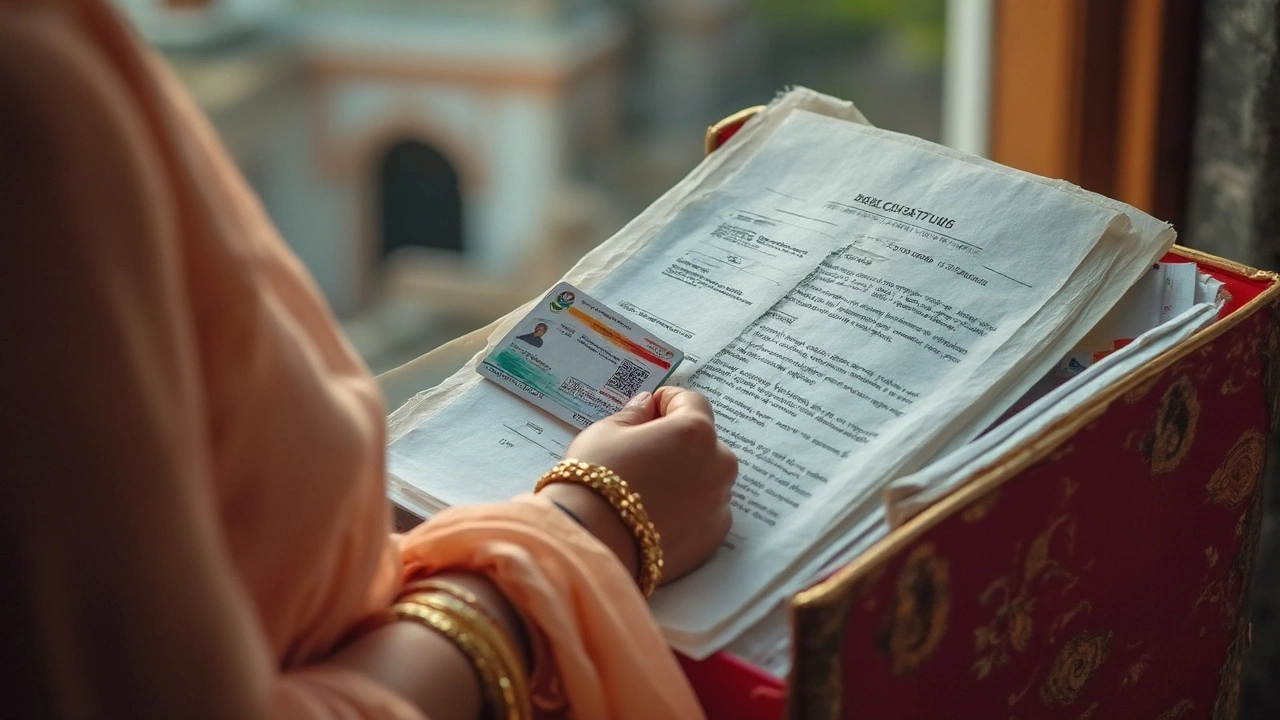If you ever need to prove you own your house, land, or any property, you’ll want to know exactly what counts as legal proof. The truth is, just having your name on the mailbox doesn’t cut it. Think about selling your place, getting a bank loan, or dealing with a tricky neighbor—if you can’t show the right document, you could be in serious trouble.
The big players here are the title and the deed. These sound pretty similar, but they’re not the same thing. Mess this up, and you might waste time (or worse, lose money). It’s smart to understand what actually proves ownership in the eyes of the law and how you can keep those documents safe and ready to go whenever you need them.
- What Is Proof of Property Ownership?
- Titles vs. Deeds: Know the Difference
- Why Proper Documentation Matters
- How to Fix Lost or Incomplete Ownership Proof
What Is Proof of Property Ownership?
So what does proof of property ownership actually mean? It's basically whatever official paperwork says in black-and-white: this home, land, or apartment belongs to you. In most places, a government office (like the land registry or county records) keeps a record of it. A simple receipt or a set of keys isn't enough—without the right document, your claim doesn't really stand a chance if someone challenges it.
The most common forms of property ownership proof are:
- Title Deeds – These are the #1 go-to. A title deed is a legal document that proves you have ownership rights. It records info like your name, property address, and sometimes even a map or sketch of the lot.
- Sale or Purchase Agreements – These show you bought the place, but they’re not the end-all unless filed with the right local office.
- Registration Documents – After a sale, your name should be updated in government records. This is often called a "certificate of title," "land registration certificate," or something similar depending on where you live.
- Tax Receipts or Property Tax Records – While not always enough on their own, these back up your claim and help if things get messy.
What counts as valid proof of ownership can shift from country to country or even city to city. For example, in the US, everything hinges on recorded deeds, while in the UK, the Land Registry certificate is often king. If you own property overseas, you’ll want to check exactly what’s standard in that country—and don’t count on one type of document working everywhere.
| Country | Main Proof Document | Where It's Registered |
|---|---|---|
| United States | Title Deed | County Recorder's Office |
| United Kingdom | Land Registry Title Document | HM Land Registry |
| India | Sale Deed + Mutation Certificate | Sub-Registrar Office / Revenue Dept. |
| Australia | Certificate of Title | Land Titles Office |
The bottom line: to prove you own property, the magic document is almost always the one that local government offices have on file with your name on it. If you’re not sure you have the right proof, check with your local registry—missing paperwork can turn into a headache fast.
Titles vs. Deeds: Know the Difference
If you’re looking to show real proof of property ownership, it pays to know exactly what a title is, and how it’s different from a deed. A lot of people use these words like they’re twins, but they actually play very different roles when you own land, a condo, or a house.
The title isn’t a literal piece of paper—it’s your legal right to own and use that property. Think of it as the concept or idea that you truly own the place. The deed is what puts that ownership in writing. It’s the official paper, with all the legal signatures, that says you actually own the property and records you in the government’s system.
- Title: The legal idea and rights to a property. Not a paper, but the fact you own the place.
- Deed: The physical/legal document you get after buying a property. It’s your receipt and proof, often signed, sealed, and filed at the local land office.
Every time a property changes owners, the deed is updated and filed. There are different types of deeds that can affect how strong your ownership is. Warranty deeds, for example, come with strong guarantees. Quitclaim deeds pass whatever interest the old owner had, but not much guarantee. Here’s a look at common deed types and what they mean for you:
| Deed Type | What It Means | Common Use |
|---|---|---|
| Warranty Deed | Full protection, seller promises no problems with ownership | Traditional home sale |
| Quitclaim Deed | No guarantees, just transfers what the seller owns (if anything) | Family transfers, correcting mistakes |
| Special Warranty Deed | Protects only from issues during seller’s ownership | Commercial deals |
If you want to make sure you actually “own” your property in a legal fight, having the deed in your name, correctly recorded at your local land registry or clerk’s office, is key. A missing or unfiled deed can come back to haunt you years down the road. Double-check your documents and keep a copy somewhere safe; most offices will let you order a new certified copy if needed, but it’s not instant.

Why Proper Documentation Matters
Forget everything you’ve heard about “word of mouth” or taking someone’s promise when it comes to property. Without real paperwork, you don’t officially own anything, no matter how long you’ve lived there or how much you paid. Banks, courts, and even your future buyers want more than just your say-so—they want hard evidence. That’s why proof of property ownership is so critical.
If you ever want to sell, refinance, or even swap your property, buyers and lenders will demand to see a title or deed. No one’s handing over money without being sure the property is really yours. In fact, it’s pretty common for deals to fall through just because the owner can’t dig up the right documents.
There’s also the legal angle. If a neighbor suddenly claims your land, or if the government tries to re-zone your area, your best (and sometimes only) line of defense is showing you have your title or deed squared away. These aren’t just pieces of paper—they’re your legal shield. In some countries, your property rights are basically meaningless without them.
Beyond ownership, proper documentation protects you from nasty surprises like unpaid taxes from the previous owner, weird claims from distant relatives, or old loans still attached to the property. If your paperwork is all set, you avoid unnecessary stress and possible lawsuits down the road.
- Only a registered title or notarized deed is usually recognized in court.
- Many countries now keep digital property records, but you should always keep a paper copy in a safe place. I keep mine locked up and Clara made digital backups on our cloud account—for real peace of mind.
- Lost or poorly recorded documents can seriously delay any property transaction—or make it impossible.
How to Fix Lost or Incomplete Ownership Proof
Losing your property paperwork feels like misplacing your car keys—but with way more at stake. If you can't find your title or deed, don’t panic, but don't ignore it. Without these, proving you own the place gets a lot harder.
The quickest move is to figure out which document is missing. If it’s the deed, check with the local land registry or city hall where your property is registered. These offices keep official copies for situations just like this. For houses in the US, county recorders handle this. In the UK, it’s the Land Registry’s job. Most places now have a process for getting certified copies, sometimes even online. The catch? You’ll usually pay a fee—anywhere from $10 to $100, depending on the record and location.
If there’s a mistake or something is just plain missing (maybe your name isn’t on the document, or a past transfer wasn’t recorded properly), you’ll have to fix it:
- Bring all backup: Tax payments, old utility bills, and any contracts you can find can help your case.
- Check the chain of title: This is a fancy way of looking at who owned your property before you. If a sale or inheritance wasn’t done right, you’ll need a lawyer's help to clear things up.
- Request corrections: Registrars usually have forms for updating records or replacing lost deeds, but you’ll have to show solid proof.
Sometimes things get complicated. For example, property fraud cases in places like Florida hit an all-time high in 2023, when reports of fake deeds doubled compared to 2018. This made officials beef up ID requirements for deed requests. Always make sure the office you contact is legit—if someone asks for payment by gift card or crypto, run away fast.
| Steps | Typical Cost | Where to Go |
|---|---|---|
| Get a certified copy of your deed | $10 - $100 | County recorder, Land Registry |
| Fix an error or add missing info | $0 - $500 (if legal help needed) | Local land office, real estate attorney |
| Re-establish title (if it was lost or destroyed) | $100 - $2,000+ | Court process |
Just remember: scan and back up your ownership docs right now—even a photo on your phone can be a lifesaver. And if you ever sell or refinance, double-check that all your info matches up. If you’re not sure, ask the recorder’s office or a property lawyer to review your proof of property ownership before you run into trouble.

